
Jean-Luc Godard was a French and Swiss film director, screenwriter, and film critic. He rose to prominence as a pioneer of the French New Wave film movement of the 1960s, alongside such filmmakers as François Truffaut, Agnès Varda, Éric Rohmer and Jacques Demy. He was arguably the most influential French filmmaker of the post-war era. According to AllMovie, his work "revolutionized the motion picture form" through its experimentation with narrative, continuity, sound, and camerawork. His most acclaimed films include Breathless (1960), Vivre sa vie (1962), Contempt (1963), Band of Outsiders (1964), Alphaville (1965), Pierrot le Fou (1965), Masculin Féminin (1966), Weekend (1967) and Goodbye to Language (2014).
David Holzman's Diary is a 1967 American mockumentary, or work of metacinema, directed by James McBride and starring L. M. Kit Carson. A feature-length film made on a tiny budget over several days, it is a work of experimental fiction presented as an autobiographical documentary. "A self-portrait by a fictional character in a real place—New York's Upper West Side," the film comments on the title character's personality and life as well as on documentary filmmaking and the medium of cinema more generally. In 1991, David Holzman's Diary was included in the annual selection of 25 motion pictures added to the National Film Registry of the Library of Congress, being deemed "culturally, historically, or aesthetically significant" and recommended for preservation.
Cinéma vérité is a style of documentary filmmaking developed by Edgar Morin and Jean Rouch, inspired by Dziga Vertov's theory about Kino-Pravda. It combines improvisation with use of the camera to unveil truth or highlight subjects hidden behind reality. It is sometimes called observational cinema, if understood as pure direct cinema: mainly without a narrator's voice-over. There are subtle, yet important, differences between terms expressing similar concepts. Direct cinema is largely concerned with the recording of events in which the subject and audience become unaware of the camera's presence: operating within what Bill Nichols, an American historian and theoretician of documentary film, calls the "observational mode", a fly on the wall. Many therefore see a paradox in drawing attention away from the presence of the camera and simultaneously interfering in the reality it registers when attempting to discover a cinematic truth.

Husbands is a 1970 American comedy-drama film written and directed by John Cassavetes. It stars Ben Gazzara, Peter Falk, and Cassavetes as three middle class men in the throes of a midlife crisis following the death of a close friend.

Věra Chytilová was an avant-garde Czech film director and pioneer of Czech cinema. Banned by the Czechoslovak government in the 1960s, she is best known for her Czech New Wave film Sedmikrásky (Daisies). Her subsequent films screened at international film festivals, including Vlčí bouda (1987), which screened at the 37th Berlin International Film Festival, A Hoof Here, a Hoof There (1989), which screened at the 16th Moscow International Film Festival, and The Inheritance or Fuckoffguysgoodday (1992), which screened at the 18th Moscow International Film Festival. For her work, she received the Ordre des Arts et des Lettres, Medal of Merit and the Czech Lion award.
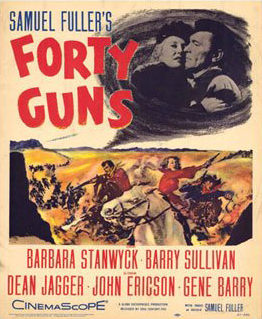
Forty Guns is a 1957 American Western film written and directed by Samuel Fuller, filmed in black-and-white CinemaScope and released by the 20th Century Fox studio. The film stars Barbara Stanwyck, Barry Sullivan and Gene Barry.
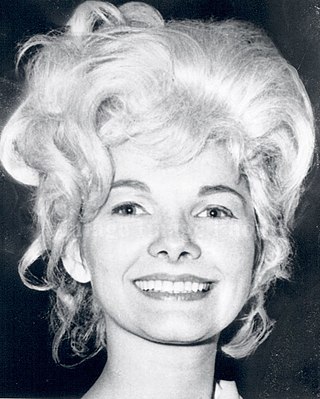
Barbara Ann Loden was an American actress and director of film and theater. Richard Brody of The New Yorker described Loden as the "female counterpart to John Cassavetes".
Hitchcockian films are those made by various filmmakers, with the styles and themes similar to those of Alfred Hitchcock.

Just Another Girl on the I.R.T. is a 1992 American drama film written, produced, and directed by Leslie Harris. The film follows Chantel, a Black teenager living in the New York City projects. The film addresses a variety of contemporary social and political issues including teenage pregnancy, abortion, racism, poverty, and HIV/AIDS. Just Another Girl on the I.R.T. is Harris' first and only feature film to date. The film premiered at the 1992 Toronto International Film Festival and later screened at the 1993 Sundance Film Festival, where it won the Special Jury Prize. Ariyan A. Johnson earned an Independent Spirit Award nomination for Best Actress.

Anna Biller is an American filmmaker who wrote and directed the feature films Viva (2007) and The Love Witch (2016). Biller considers herself a feminist filmmaker and consciously explores feminist themes throughout her work, including exploring the female gaze in cinema. She is vocal on both her website and in interviews about gender inequalities in the film industry.

Chameleon Street is a 1989 independent film written by, directed by and starring Wendell B. Harris Jr. It tells the story of a social chameleon who impersonates reporters, doctors and lawyers in order to make money.
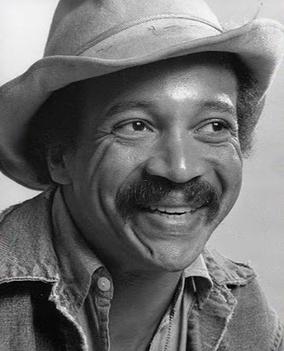
William Harrison Gunn was an American playwright, novelist, actor and film director. His 1973 cult classic horror film Ganja & Hess was chosen as one of ten best American films of the decade at the Cannes Film Festival, 1973. In The New Yorker, film critic Richard Brody described him as being "a visionary filmmaker left on the sidelines of the most ostensibly liberated period of American filmmaking." Filmmaker Spike Lee had said that Gunn is "one of the most under-appreciated filmmakers of his time." Gunn's drama Johnnas won an Emmy Award in 1972.
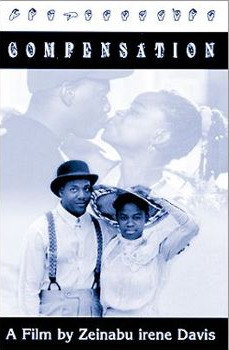
Compensation is a 1999 independent drama film produced, co-edited and directed by Zeinabu irene Davis and written by Marc Arthur Chéry. The film is about two parallel love stories set in turn-of-the-century and present-day Chicago, with both stories concerning a relationship between a deaf woman and a hearing man. The story is inspired by the 1906 poem of the same name from early African-American writer Paul Laurence Dunbar. The film stars Michelle A. Banks and John Earl Jelks in the leading roles. The early part of the story is shot like a silent film. Though the film was not released until 1999, filming took place in 1993.
Kathleen Collins was an American poet, playwright, writer, filmmaker, director, civil rights activist, and educator from Jersey City, New Jersey. Her two feature narratives – The Cruz Brothers and Miss Malloy (1980) and Losing Ground (1982) – furthered the range of Black women's films. Although Losing Ground was denied large-scale exhibition, it was among the first films created by a Black woman deliberately designed to tell a story intended for popular consumption, with a feature-length narrative structure. Collins thus paved the way for Julie Dash's Daughters of the Dust (1991) to become the first feature-length narrative film created by a Black woman to be placed in commercial distribution. Influenced by Lorraine Hansberry, she wrote about "African Americans as human subjects and not as mere race subjects" [emphasis in the original].

Emerald Lilly Fennell is an English actress, filmmaker, and writer. She has received numerous accolades, including an Academy Award, two BAFTA Awards, and nominations for three Primetime Emmy Awards and three Golden Globe Awards.
Lumière is a French drama film written and directed by Jeanne Moreau. The semi-autobiographical film is about the friendship between four actresses. It is credited as being one of the first films to focus on female friendship.

Cane River is a 1982 American romantic drama film that was lost until its rediscovery in 2013 and its subsequent re-release in 2018 and beyond. It was written, produced, and directed by Horace B. Jenkins. The film features the lives of African Americans in the US state of Louisiana. While the film premiered in New Orleans, Louisiana, in 1982, Horace Jenkins died before the film could be released in New York City and beyond. The film was considered lost until a negative was recovered in 2013.
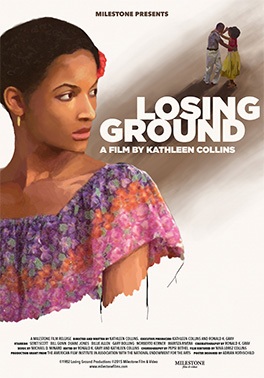
Losing Ground is a semiautobiographical 1982 American drama film written and directed by Kathleen Collins, and starring Seret Scott, Bill Gunn and Duane Jones. It is the first feature-length drama directed by an African-American woman since the 1920s and won First Prize at the Figueira da Foz International Film Festival in Portugal.
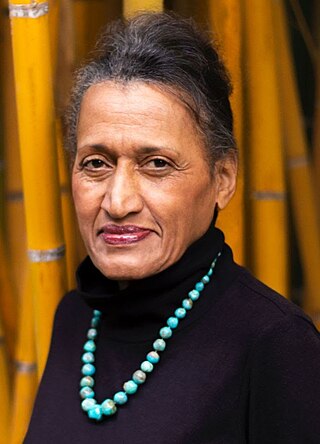
Fronza Woods is an American filmmaker best known for her short films including Killing Time (1979) and Fannie's Film (1982).
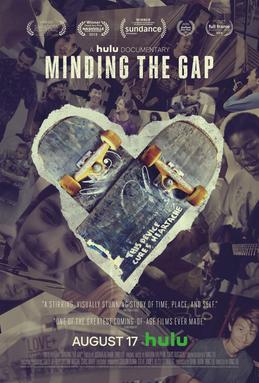
Minding the Gap is a 2018 documentary film directed by Bing Liu and produced by Liu and Diane Moy Quon through Kartemquin Films. It chronicles the lives and friendships of three young men growing up in Rockford, Illinois, united by their love of skateboarding. The film received critical acclaim, won the U.S. Documentary Special Jury Award for Breakthrough Filmmaking at the 2018 Sundance Film Festival, and was nominated for Best Documentary Feature at the 91st Academy Awards.















